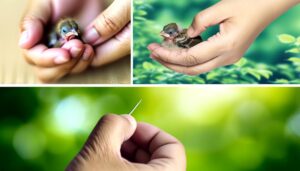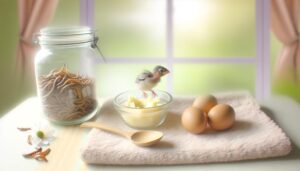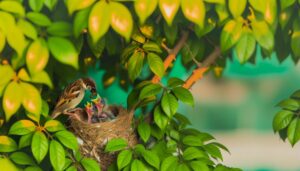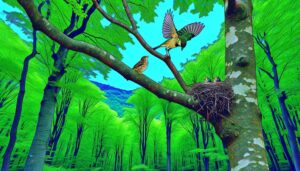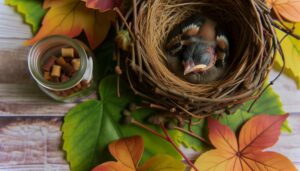Can Baby Sparrow Eat Banana?
Yes, baby sparrows can eat bananas, but they shouldn't replace their primary diet of high-protein foods like insects. A sparrow's rapid growth demands a protein-rich diet, essential for tissue and muscle development.
While bananas provide vitamins like potassium and vitamin C, overconsumption can lead to digestive upset and disrupt their nutritional balance. Always prioritize their insectivorous feeding habits and offer insects such as mealworms daily.
Occasionally adding mashed fruits like bananas can be beneficial for extra vitamins and easy digestion. Hydration is also essential, so make sure fresh water is available.
For best health and growth, continue to explore proper dietary practices.
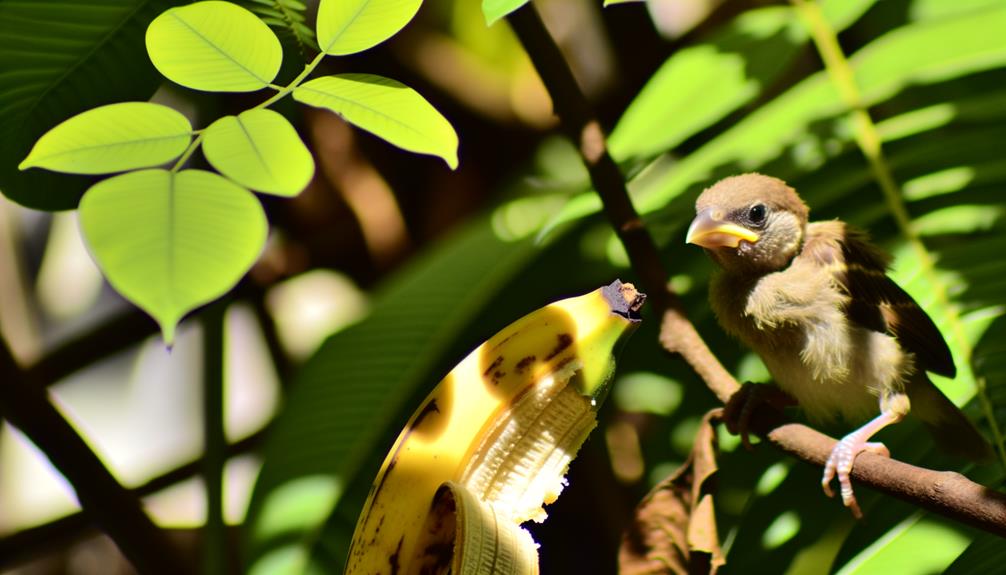
Key Takeaways
- Baby sparrows can eat bananas in small amounts due to their high vitamin and mineral content.
- Bananas should be mashed for easy digestion and to avoid choking hazards.
- High-sugar content in bananas can disrupt a baby sparrow's nutritional balance if fed excessively.
- Bananas should not replace protein-rich foods like insects essential for growth and development.
- Offer bananas occasionally as part of a varied diet to provide nutritional benefits without overloading on sugar.
Baby Sparrow Diet Basics
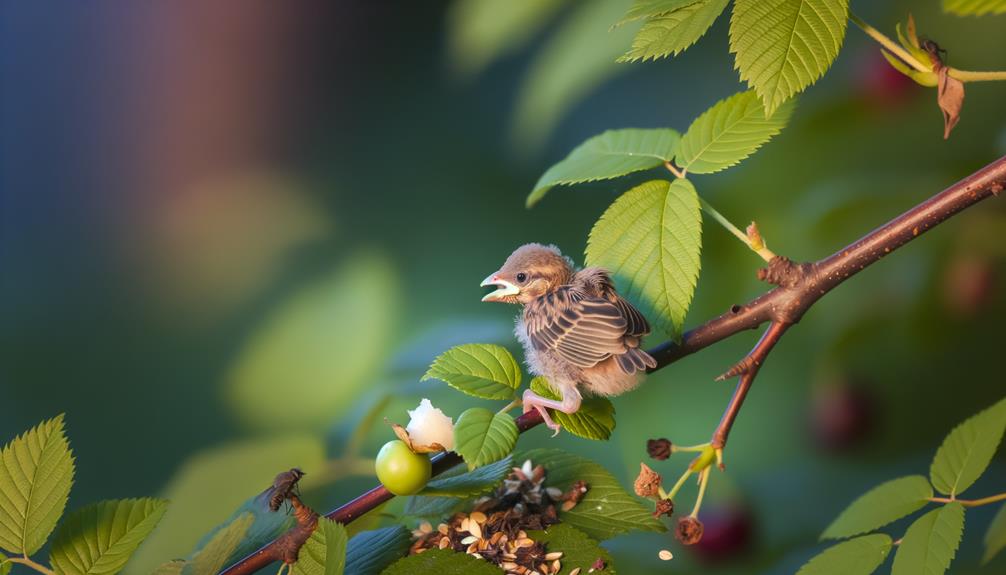
A baby sparrow's diet primarily consists of high-protein foods such as insects and small invertebrates. You'll find that they thrive on a variety of arthropods, including caterpillars, spiders, and aphids. Their parents actively forage to provide these protein-rich meals, essential for rapid growth and development.
You should observe that baby sparrows exhibit gaping behavior, where they open their beaks wide, signaling their readiness for feeding. This instinctual act guarantees they receive the necessary nutrients during their early life stages. Additionally, the diet is supplemented with regurgitated seeds and plant matter, though proteins remain the primary focus.
Nutritional Needs
Understanding the nutritional needs of baby sparrows involves recognizing their requirement for a high-protein diet to support rapid growth and development. You should focus on providing foods rich in essential amino acids, which are essential for tissue formation and muscle development. Insects, such as mealworms and crickets, are excellent protein sources.
Additionally, maintain a balance of vitamins and minerals, particularly calcium and phosphorus, to promote strong bone structure. Hydration is equally important; offer water but avoid drowning hazards.
Pay attention to the frequency and portion size of feedings, as baby sparrows have high metabolic rates and need frequent nourishment. By meeting these nutritional needs, you'll contribute significantly to the health and survival of baby sparrows in your care.
Benefits of Bananas
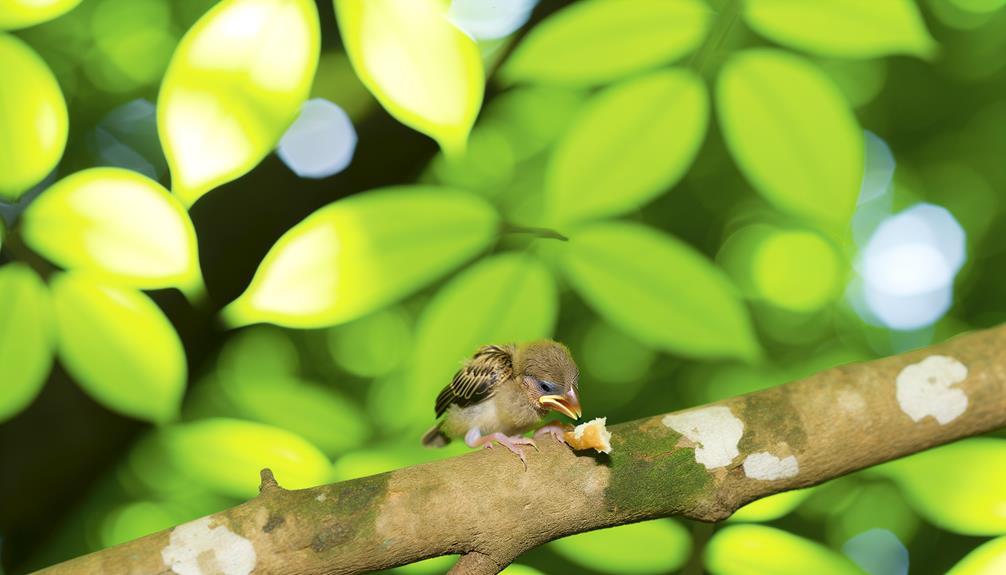
Incorporating bananas into the diet of baby sparrows can provide a beneficial source of essential vitamins and minerals, including potassium and vitamin C. Potassium plays a critical role in muscle function and neurological health, while vitamin C supports immune function and tissue repair.
Bananas also offer dietary fiber, aiding in digestive health, and natural sugars, providing a quick energy boost. Their soft texture makes them easy for baby sparrows to consume and digest. Additionally, bananas contain antioxidants, which help protect cells from damage caused by free radicals.
Potential Risks
Feeding baby sparrows bananas may introduce potential risks such as digestive upset and sugar overload, which can impact their overall health negatively. Baby sparrows have a specific dietary need that's primarily insectivorous. Introducing high-sugar fruits like bananas can disrupt their nutritional balance. You might observe symptoms like diarrhea, lethargy, and reduced growth rates.
Here are some potential risks:
- Digestive Imbalance: High sugar content can cause gastrointestinal disturbances.
- Nutrient Deficiency: Bananas lack essential proteins, fats, and amino acids critical for growth.
- Metabolic Stress: Excess sugar can lead to metabolic overload, affecting energy levels.
- Behavioral Changes: Altered feeding patterns due to high sugar intake.
- Long-Term Health Issues: Potential for obesity and related complications.
Always consider the natural diet of baby sparrows.
Safe Feeding Practices
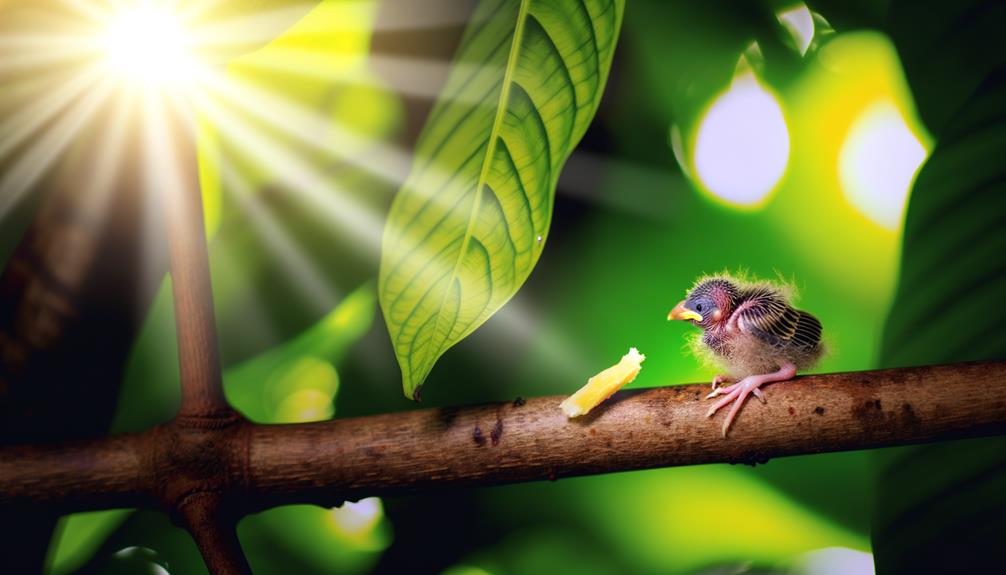
Promoting the health and growth of baby sparrows involves providing a diet that closely mimics their natural insectivorous feeding habits. You should focus on offering foods rich in proteins and essential nutrients. Avoid feeding them bread or processed foods, as these lack the necessary vitamins and minerals. Here's a quick reference table for safe feeding practices:
| Food Type | Benefits | Frequency |
|---|---|---|
| Insects (mealworms) | High protein, fosters growth | Daily |
| Mashed fruits | Vitamins, easy to digest | Occasionally |
| Hard-boiled eggs | Protein, essential fats | Weekly |
| Small grains | Fiber, energy source | Sparingly |
| Fresh water | Hydration, vital for survival | Always available |
Stick to these guidelines to make sure your baby sparrow thrives.
Conclusion
Feeding baby sparrows is like fine-tuning a delicate instrument; their dietary needs are specific and critical. While bananas offer nutritional benefits, they should only be a minor supplement. Over-reliance on them could pose risks, including digestive issues.
Always prioritize a varied diet rich in proteins and essential vitamins. By following safe feeding practices, you're ensuring these fledglings grow into healthy adults. Remember, balance is key in nurturing these tiny avian wonders.

